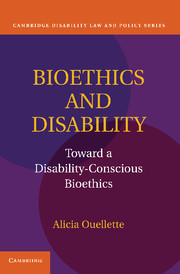3 - Infancy
Published online by Cambridge University Press: 07 June 2011
Summary
A newborn baby is a tiny bundle of potential whose arrival is often met with joy and wonder. The arrival of a baby born with a disability or a health condition that may result in disabilities can generate more complicated reactions. To be sure, some parents welcome a baby with disabilities with the same joy and wonder as they would any other child. Indeed some parents celebrate the arrival of a child with traits like deafness and achondroplasia as special blessings foretelling a life that will be enriched by the special trait. For many families, however, the realization that an infant has or might develop disabilities brings with it concern, fear, even grief. Whatever the parental reaction, the presence or potential for disability in an infant often means the need for medical decision making. Most decisions made for infants with disabilities are about routine matters, but some are quite literally a matter of life or death. As is evident in the case studies that follow, making decisions about when to use or refuse life-saving treatments for infants with disabilities can be wrenching regardless of parental or analytic perspective.
The law provides some guidance. The advent of the modern neonatal intensive care unit (NICU) in the 1970s brought with it an ever-increasing ability to save the lives of babies facing life-threatening crises. As options for saving imperiled newborns increased, the public's interest in medical protocols that allowed babies to die also increased.
- Type
- Chapter
- Information
- Bioethics and DisabilityToward a Disability-Conscious Bioethics, pp. 72 - 136Publisher: Cambridge University PressPrint publication year: 2011



